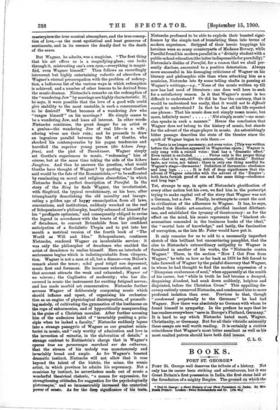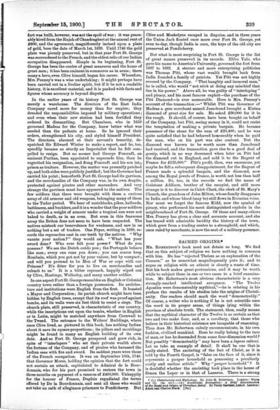BOOKS.
FORT ST. GEORGE.*
FORT St. George well deserves the tribute of a history. Not only has its career been striking and adventurous, but it was Great Britain's first possession in India, the first stone laid at the foundation of a mighty Empire. The ground on which the • Art St. George : a Short History of our First Poisesstois in India. By Km Fmk issuer• London : Swan aonatawbota and Oo. (Pa ed.}
fort was built, however, was not the spoil of war ; it was peace- ably hired from the Rajah of Chandragheri at the annual rent of £600, and the agreement, magnificently incised upon a plate of gold, bore the date of March 1st, 1639. Until 1746 the gold plate was piously preserved, but in that year Fort St. George was surrendered to the French, and the oldest relic of our Indian occupation disappeared. Simple in its beginning, Fort St. George has been the centre of great measures and the home of great men ; it has been eminent in commerce as in arms ; there many a hero, even Clive himself, began his career. Wherefore, Mrs. Penney's was a wise undertaking; it might perhaps have been carried out in a livelier spirit, but if it be not a readable history, it is excellent material, and it is packed with facts and figures whose accuracy is beyond dispute.
In the earlier years of its history Fort St. George was merely a warehouse. The directors of the East India Company cared more for money than for empire ; they dreaded the responsibilities imposed by military operations ; and even when their new station had been fortified they ordered its dismantling. But Chambers, who in 1659 governed Madras for the Company, knew better what was needed than the pedants at home. So he ignored their orders, strengthened his city, and styled himself President. The directors, alarmed at their servant's temerity, de- spatched Sir Edward Winter to make a report, and he, too, speedily became so sturdy an Imperialist that he felt com- pelled to resign. But no sooner had George Foxcraft, an eminent Puritan, been appointed to supersede him, than he regretted his resignation, and flung Foxcraft and his son into prison as traitors. However, the matter was presently patched up, and both sides were publicly justified ; but the Governor had carried his point ; henceforth Fort St. George had its garrison, and the merchandise of the Company was, in its own despite, protected against pirates and other marauders. And very strange the garrison must have appeared to the natives. The few soldiers that there were brought with them a curious array of old armour and old weapons, belonging many of them to the Tudor period. We hear of matchlocks, pikes, halberds, battleaxes, and bucklers, and it is a wonder that the poor soldiers who carried a weight of armour under a tropical sun were not baked to death, as in an oven. But even in this fearsome array the Briton does not seem to have been respected. The natives mistook our benevolence for weakness, and saw in us nothing but a set of traders. One Fryer, writing in 1680, re- cords the reproaches cast in our teeth by the natives. " Why vaunts your nation? " they would ask. " What has your sword done P Who ever felt your power What do you possess ? We see the Dutch outdo you ; the Portugals behave like men ; every one runs you down ; you can scarce keep Bombain, which you got not by your valour, but by compact ; and will you pretend to be Men of War or cope with our Princes ? It's fitter for you to live on merchandise and submit to us." It is a bitter reproach, happily wiped out by Clive, Hastings, Wellesley, and many another soldier.
In one aspect Fort St. George resembles an English or Colonial country town rather than a foreign possession. Its architec- ture and institutions were English from the first. It boasted a Mayor and Corporation ; its parish church might have been hidden by English trees, except that its roof was proof against bombs, and its walls were six feet thick to resist a siege. The church plate, still preserved, is characteristic of our country, while the inscriptions cut upon the tombs, whether in English or in Latin, might be matched anywhere from Cornwall to the Tweed. The entrance to the Writers' Buildings, where once Clive lived, as pictured in this book, has nothing Indian about it save its square proportions ; its pillars and mouldings might be found in many an English building of its own date. And so Fort St. George prospered and grew rich, in spite of " interlopers " who set their private wealth above the fortune of the Company, and of pirates who harassed the Indian seas with fire and sword. Its saddest years were those of the French occupation. It was on September 10th, 1746, that Governor Morse, holding the opinion that the fort could not sustain an attack, capitulated to Admiral de la Bour- donnais, who for his part promised to restore the town in three months on payment of a ransom of £400,000. Unhappily for the honour of France, Dupleix repudiated the terms offered by De is, Bourdonnais, and sent all those who would not take an oath of allegiance prisoners to Pondicherry. But Clive and Maskelyne escaped in disguise, and in three years the Union Jack floated once more over Fort St. George, yet even to-day, though India is ours, the keys of the old city are preserved at Pondicherry.
But what is most surprising in Fort St. George is the list of great names preserved in its records. Elihu Yale, who gave his name to America's University, governed the fort from 1687 to 1692. A sterner and more enterprising politician was Thomas Pitt, whose vast wealth brought back from India founded a family of patriots. Yet Pitt was not highly revered by the Company. " That haughty and immoral man," he is called, who would " not stick at doing any mischief that lies in his power." Above all, he was guilty of " interloping " and piracy, and his most famous exploit—the purchase of the Pitt Diamond—is ever memorable. Here is Mrs. Penney's account of the transaction :—" Whilst Pitt was Governor of Madras a gem merchant named Jamchund brought a Kistna diamond of great size for sale. He asked £30,000 for it in the rough. It should, of course, have been bought on behalf of the Company, but Pitt, seeing money in it, could not resist the temptation of making a private bargain. He became possessor of the stone for the sum of L'20,400 ; and he was quite satisfied that he had behaved honourably when he paid the man, who on his part was also content. But the diamond was known to be worth more than Jamchund had received, and the transaction gave rise to a good deal of gossip, which in no way decreased when later on Pitt had the diamond cut in England, and sold it to the Regent of France for £135,000." Pitt's profit, then, was enormous, yet maybe he felt a subsequent disappointment, for the Regent of France made a splendid bargain, and the diamond, now among the Royal jewels of France, is worth not less than half a million. So, too, in the records we find the name of Gulstone Addison, brother of the essayist, and still more strange is it to discover in Caleb Clark, the clerk of St. Mary's Church, the grandson of John Milton, whose family disappears in India and whose blood (may be) still flows in Eurasian veins. Nor must we forget the famous Kidd, now the symbol of piracy, who performed his most distinguished exploits in the neighbourhood of Fort St. George. Of these and many others Mrs. Penney has given a clear and accurate account, and she has traced with admirable lucidity the history of the town, which grew from a trading centre to a stronghold, and which, once ruled by merchants, is now the seat of a military governor.







































 Previous page
Previous page